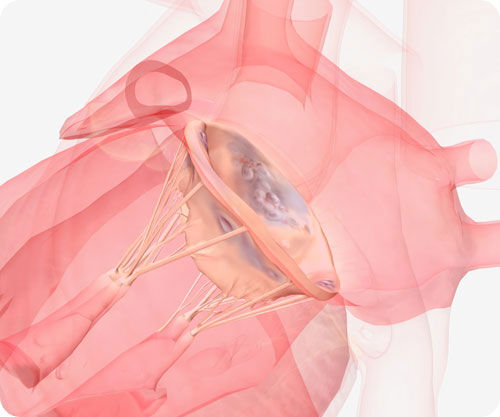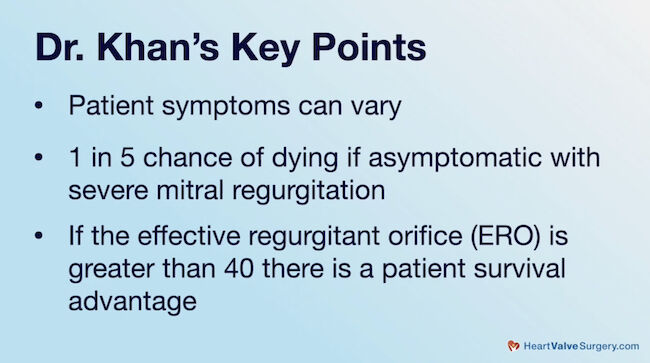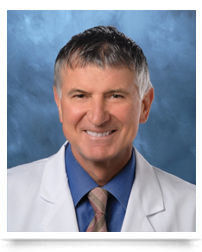Surgeon Q&A: Risks Versus Benefits of Asymptomatic Mitral Valve Surgery
Written By: Allison DeMajistre, BSN, RN, CCRN
Medical Expert: Junaid Khan, MD, Cardiac Surgeon, Alta Bates Summit Medical Center, Oakland, California
Reviewed By: Adam Pick, Patient Advocate, Author & Website Founder
Published: October 1, 2024
When the mitral valve doesn’t close properly due to mitral valve prolapse (see picture below), it allows the abnormal backward flow of blood from the left ventricle to the left atrium. This condition is called mitral valve regurgitation (MR), a leaking valve or mitral insufficiency. It is the most common heart valve abnormality – affecting over two percent of the population – and its prevalence increases with age.
 Mitral Valve Prolapse
Mitral Valve Prolapse
The left ventricle can often adapt to the abnormal backflow across the mitral valve and symptoms may not be apparent for many years. Many asymptomatic patients don’t even know they have a leaky mitral valve until a doctor listens to their heart during a routine exam and hears a murmur. If the regurgitation progresses, the heart’s structure can change and make it difficult to regain normal cardiac function.
But if there aren’t symptoms, how do patients know when mitral regurgitation is becoming more severe, putting them at risk for further complications? We recently received a question from Erica on this specific topic, who asked: “What is the latest opinion on the risk versus benefit of watchful waiting for mitral valve repair versus proactive surgery if a patient is asymptomatic but has severe regurgitation?”
To answer Erica’s question, we met with Dr. Junaid Khan, a leading cardiac surgeon at Alta Bates Summit in Oakland. Dr. Khan has performed thousands of heart valve procedures, and mitral valve repair is among his many specialties.
Key Learnings About Watchful Waiting Versus Surgery
Here are important insights shared by Dr. Khan in his response to Erica:
- Patients, primary care providers, and cardiologists commonly ask Erica’s question. Khan said, “Erica, that is a fantastic question. I will tell you it’s probably one of the most common questions I get asked, not only from patients but from their primary care providers and even some outside cardiologists. The first thing I always tell patients is I don’t necessarily believe them when they tell me they’re truly asymptomatic.” Dr. Khan explained that people’s symptoms can be varied. “I’ll give you an example of a patient I operated on a couple of weeks ago. He used to walk 18 holes of golf. Now, he takes a cart. He says he’s asymptomatic, but really, that is his symptom. You really want to be honest with yourself about the symptoms. Now, if you are truly asymptomatic, there are some gold standard studies published in the New England Journal that talk about asymptomatic patients.”
- A quantitative assessment of mitral regurgitation is essential. “Even today, you have a one in five chance of dying if you’re asymptomatic with severe mitral regurgitation,” said Dr. Khan. “The most important thing you can do is make sure you have a quantitative assessment of your mitral regurgitation.” Dr. Khan explained that severe mitral regurgitation can have a different meaning for certain people, but a transesophageal echocardiogram (TEE) can give that quantitative assessment, or measurement of mitral regurgitation, by assigning it a specific number called an Effective Regurgitant Orifice, or ERO. Dr. Khan said, “If that number is greater than 40, I know the survival advantage today, in my hands and particularly when we can do it minimally invasively, is much better to have surgery sooner rather than later.”

- What would be Dr. Khan’s recommendation for Erica? “I think, Erica, you need to define what severe mitral regurgitation means,” said Dr. Khan. “If you haven’t had a transesophageal echocardiogram, you’ll want to get that, and you want to know what the effective regurgitant orifice, ERO, is. If it’s greater than 40, then you should see a surgeon who can do this minimally invasively for a survival advantage.”
Thanks Dr. Khan and Alta Bates Summit!
On behalf of Erica and our HeartValveSurgery.com patients worldwide, thank you to Dr. Junaid Khan for sharing your expert insight into the risk versus benefit of mitral valve surgery for asymptomatic mitral regurgitation patients! We would also like to thank Dr. Khan’s Alta Bates Summit Medical Center team for taking great care of our heart valve patients!
Related links:
- Surgeon Q&A: Is Minimally Invasive Mitral Valve Re-Replacement Possible?
- Cardiologist Insights: Asymptomatic Mitral Valve Regurgitation
- Explore Dr. Khan’s Interactive Surgeon Profile with 30+ Patient Reviews
Keep on tickin!
Adam
P.S. For the deaf and hard-of-hearing members of our community, I have provided a written transcript of this interview with Dr. Khan below.
Video Transcript:
Adam Pick: Hi, everybody, it’s Adam with heartvalvesurgery.com. We’re in San Antonio, Texas at the annual meeting of The Society of Thoracic Surgeons. I am thrilled to be joined by Dr. Junaid Khan, who is a leading cardiac surgeon at Alta Bates Summit in Oakland, California. During his extraordinary career, Dr. Khan has performed thousands of heart valve procedures. Dr. Khan, you and I have known each other for over 10 years. It is great to see you again, and thanks for being with us.
Dr. Khan: Adam, I think the service you provide for the community is so outstanding. There’s so many patients who come to us who have been inspired by your website and will actually have come to us with qu:stions based on looking through your website.
Adam Pick: Yeah, well, speaking of questions, we’re at this great conference. We’re learning a lot, fantastic meetings and presentations, and we have a patient question that just came in for us, Dr. Khan, that is right up your alley given your specialties. This one came in from Erica and she asks, “What is the latest opinion on risk versus benefit of watchful waiting for mitral valve repair versus proactive surgery if a patient is asymptomatic but has severe regurgitation?”
Dr. Khan: Erica, that is a fantastic question. I will tell you that’s probably one of the most common questions I get asked, not only from patients but from their primary care providers and even from some outside cardiologists. First thing I always tell patients is I don’t necessarily believe them when they tell me they’re truly asymptomatic. Let’s take that group. People’s symptoms can be really quite varied. I’ll give you an example of a patient I operated on a couple weeks ago. He used to walk 18 holes of golf. Now he takes a cart. He says he’s asymptomatic but really that’s his symptom. Same thing, three sets of tenets versus one, whatever you want to make it, you really want to be honest with yourself about the symptoms. Now, if you truly are asymptomatic, there is some gold standard studies that were published in the New England Journal that talk about asymptomatic patients.
Even today, you have a one in five chance of dying if you’re asymptomatic with severe mitral regurgitation. The most important thing you can do is make sure you have a quantitative assessment of your mitral regurgitation. Severe mitral vegetation means some things to certain people, but if you have a transesophageal echo, the fancy ultrasound where they put a tube down your throat and they can actually quantify it, and in that, there’s a very specific number called ERO. If that’s greater than 40, I know the survival advantage today in my hands, particularly when we can do it minimally invasively, is much better to have surgery sooner rather than later.
Adam Pick: For Erica, what would be your recommendation for her?
Dr. Khan: I think, Erica, what you need to do is really define what severe mitral regurgitation means. If you haven’t had a transesophageal echocardiogram, that’s the fancy ultrasound where they put a tube down your throat to look, you want to get that and you want to know what the effective regurgitant orifice (ERO) is. If it’s greater than 40, then you should really see a surgeon who can do this minimally invasively for a survival advantage.
Adam Pick: Dr. Khan, I can’t thank you enough. Erica I hope that helped you. I know it helped me. On behalf of all the patients in our community, Dr. Khan, thanks for everything you’re doing at Alta Bates Summit in Oakland, California



